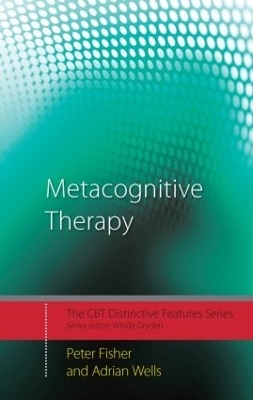
Metacognitive Therapy
Routledge (Verlag)
978-0-415-43498-0 (ISBN)
- Titel erscheint in neuer Auflage
- Artikel merken
Metacognitive therapy is based on the principle that worry and rumination are universal processes leading to emotional disorder. These processes are linked to erroneous beliefs about thinking and unhelpful self-regulation strategies.
Metacognitive Therapy: Distinctive Features is an introduction to the theoretical foundations and therapeutic principles of metacognitive therapy. Divided into two sections, Theory and Practice and using thirty key points, the authors explore how metacognitive therapy can allow people to escape from repetitive thinking patterns that often lead to prolonged psychological distress.
This book is a valuable resource for both students and practitioners wishing to develop a basic understanding of metacognitive therapy and how it compares and contrasts with traditional forms of cognitive behavioural therapy.
Peter Fisher is a Lecturer in Clinical Psychology at the University of Liverpool and a Clinical Psychologist with Manchester Mental Health and Social Care Trust. Adrian Wells is Professor of Clinical and Experimental Psychopathology at the University of Manchester and Professor II in Clinical Psychology at Norwegian University, Trondheim.
Part I: The Distinctive Theoretical Features of Metacognitive Therapy. A Focus on Metacognition. An Information Processing Model of Psychological Disorder. The Cognitive Attentional Syndrome (CAS). Metacognitive Beliefs. Object and Metacognitive Modes. Reformulated A-B-C Analysis. Detached Mindfulness. Executive Control and Attentional Flexibility. Levels of Control. Types of Knowledge. Processes Beyond Cognitive Content. View of Self-awareness. Varieties of Change. Disorder Specific Models. A Universal Treatment? Part II: The Distinctive Practical Features of Metacognitive Therapy. Conducting Therapy at the Metacognitive Level. Assessment of Metacognition. Case Formulation. Meta-level Socialisation Procedures. Shifting to a Metacognitive Mode of Processing. Modifying Negative Metacognitive Beliefs. Modifying Positive Metacognitive Beliefs. Worry/Rumination Postponement. Attention Training Technique. Implementing Detached Mindfulness. Situational Attentional Refocusing. Targeting Meta-emotions. Delivering Metacognitively Focused Exposure. Developing New Plans for Processing. Integrating MCT Techniques: A Case Study.
| Erscheint lt. Verlag | 30.1.2009 |
|---|---|
| Reihe/Serie | CBT Distinctive Features |
| Zusatzinfo | 7 Line drawings, black and white |
| Verlagsort | London |
| Sprache | englisch |
| Maße | 123 x 186 mm |
| Gewicht | 249 g |
| Themenwelt | Medizin / Pharmazie ► Medizinische Fachgebiete ► Psychiatrie / Psychotherapie |
| ISBN-10 | 0-415-43498-X / 041543498X |
| ISBN-13 | 978-0-415-43498-0 / 9780415434980 |
| Zustand | Neuware |
| Haben Sie eine Frage zum Produkt? |
aus dem Bereich



